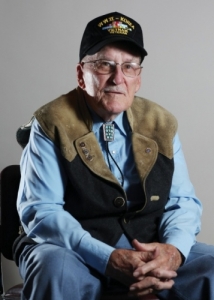Kleber awarded Congressional Gold Medal
By Ethan Smith
Published in News on December 22, 2014 1:46 PM

News-Argus/CASEY MOZINGO
Retired Col. Raymond Kleber, 89, received the Congressional Gold Medal on Dec. 10 in Washington, D.C., for his service in the Civil Air Patrol during World War II.
George Washington.
Charles Lindbergh.
Neil Armstrong.
And now, Goldsboro resident Col. Raymond Kleber, former commander of Seymour Johnson Air Force Base from 1973 to 1975.
Each received the Congressional Gold Medal for outstanding achievements and lasting impact on American history and culture.
Kleber was awarded the medal for his service in the Civil Air Patrol during World War II, when he was only 16 years old.
"If you notice, the relief here on the aircraft (on the medal) -- I thought it was very well- done -- they've got a 65 on there," Kleber said, pointing to the medal he received on Dec. 10 in Washington, D.C. "They lost 65 CAP members flying missions off the coast to spot enemy submarines."
During the war, members of the patrol volunteered to use their own planes to fly missions up to 100 miles off the East Coast to spot enemy ships and submarines and would subsequently dispatch the Army or Navy to sink enemy crafts.
They would also fly reconnaissance missions to help locate downed pilots or people lost in the wilderness.
Most weren't paid.
"They owned their own airplanes and wanted to get involved," Kleber said. "The big thing is, and the emphasis is, they volunteered to do something that our own military couldn't do at that time. They went out, found submarines, called in information and somebody would come in with an aircraft from the Navy or the Army to dispatch the particular enemy craft."
The Civil Air Patrol was so effective that its operations forced enemy craft more than 100 miles offshore to avoid detection.
"So many bad things were happening to the submarines that they moved farther out to sea and would look around with a periscope, rather than being sitting ducks along the coast wherever they were marshaled," Kleber said.
The Civil Air Patrol was eventually authorized to bomb enemy submarines. It dropped a total of 82 bombs and flew more than 24 million miles during an 18-month period. The patrol reported nearly 40 dead bodies.
Kleber said he never thought he would receive the highest civilian honor for his service as a drill instructor in the Civil Air Patrol -- and he did not serve for the accolades, either.
"When a person is 16 or 17 -- have you ever thought you were invincible? That you were bulletproof?" Kleber said. "Kids in my high school class were dead six months after they graduated high school. They were drafted into the military. They didn't get a lot of training and boom, they were in combat. The insurance man tried to tell my parents I would be dead by the time I was 21. His son died and never fired a shot -- he picked up some jungle disease out in the Pacific."
Kleber had a few harrowing experiences in his 32 years as a combat pilot after he served in the Civil Air Patrol as well.
"As I said, we think we're invincible, but look at all those that died," he said. "I've seen scary moments in the 302 missions I flew in Vietnam. I've seen bullets and things as big around as a water bottle going by the canopy and they were making a cracking sound because my speed plus their speed was breaking the sound barrier. If one of those had hit the canopy I'd be dead, and you ask yourself -- how in the hell are they missing me?"
Kleber said he was just doing his part for his country but that he was honored to be part of the ceremony.
"There were 45 of us that were alive, and 55 families of veterans that were honored," Kleber said. "Gen. (Joseph) Vasquez came to every table while the emcee talked a little bit about the recipient, and then he would hand you the medal personally. I thanked the Good Lord for giving me the longevity to do the things I have, and there is a lot of pride in me for having served my country. It may have sounded to a lot of people like I didn't do very much. Well, at 16, maybe I didn't. But I think in the next 32 years of service I did quite well for my country and for myself."
